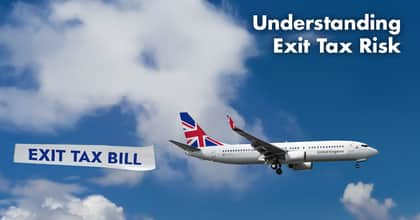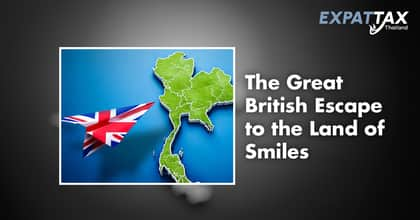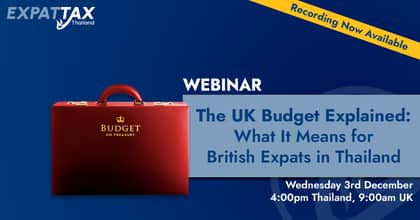สถานะการพำนักอาศัยเพื่อเสียภาษีเป็นปัจจัยสำคัญในการกำหนดว่าคุณต้องยื่นแบบแสดงรายการภาษีที่ไหน และประเทศใดมีสิทธิ์จัดเก็บภาษีจากรายได้ประเภทต่างๆ เช่น เงินบำนาญและเงินบำนาญสะสม อย่างไรก็ตาม เรื่องนี้เป็นเรื่องที่ชาวออสเตรเลียหลายคนสับสน เนื่องจากสถานะการพำนักอาศัยถูกกำหนดโดยกฎหมายเฉพาะภายใต้กฎหมายภาษีของทั้งออสเตรเลียและไทย และได้รับการชี้แจงเพิ่มเติมโดยข้อตกลงภาษีซ้อนระหว่างออสเตรเลียและไทย (DTA)
การปฏิบัติตามกฎเหล่านี้ไม่ใช่เรื่องง่ายเสมอไป เนื่องจากสถานะการพำนักอาศัยเพื่อเสียภาษีมีผลกระทบต่อการปฏิบัติตามกฎหมาย การวางแผนทางการเงิน และภาระผูกพันทางภาษี ดังนั้นการยืนยันสถานะการพำนักอาศัยจึงมีความสำคัญมากกว่าการคาดเดาหรือเลือกสถานะการพำนักอาศัยเอง เราหวังว่าบทความนี้จะเป็นประโยชน์และให้คำแนะนำที่เป็นประโยชน์
ถิ่นที่อยู่เพื่อเสียภาษีในประเทศไทย
หากคุณอยู่ในประเทศไทยเป็นเวลา 180 วันหรือมากกว่านั้นภายในปีภาษีหนึ่ง คุณจะถือเป็นผู้มีถิ่นพำนักเพื่อเสียภาษีในประเทศไทย ปีภาษีจะนับตามปีปฏิทินในประเทศไทย เมื่อนับวัน ให้นับรวมส่วนใดส่วนหนึ่งของวันที่คุณอยู่ในประเทศไทยด้วย
ข้อมูลเพิ่มเติมเกี่ยวกับกฎหมายถิ่นที่อยู่เพื่อเสียภาษีของประเทศไทย
ถิ่นที่อยู่เพื่อเสียภาษีของออสเตรเลียถูกกำหนดอย่างไร
การ สำนักงานภาษีออสเตรเลีย (ATO) ใช้การทดสอบสี่ประการเพื่อพิจารณาว่าบุคคลนั้นเป็นผู้มีถิ่นพำนักเพื่อเสียภาษีในออสเตรเลียหรือไม่:
- การทดสอบที่อยู่อาศัย: หากคุณอาศัยอยู่ในออสเตรเลียและมีบ้านอยู่ที่นั่น คุณจะเป็นผู้มีถิ่นพำนักเพื่อเสียภาษีในออสเตรเลีย
- การทดสอบถิ่นที่อยู่: หากคุณ ภูมิลำเนา (บ้านถาวรตามกฎหมาย) อยู่ในออสเตรเลียคุณเป็นผู้มีถิ่นพำนักเพื่อเสียภาษีในออสเตรเลีย เว้นแต่คุณจะจัดตั้ง ที่อยู่อาศัยถาวรนอกประเทศออสเตรเลีย.
- การทดสอบ 183 วัน: หากคุณ ใช้เวลา 183 วันหรือมากกว่าในออสเตรเลีย ในปีงบประมาณหนึ่ง โดยทั่วไปแล้ว คุณจะถือว่าเป็นผู้มีถิ่นที่อยู่เพื่อเสียภาษี เว้นแต่คุณจะสามารถพิสูจน์ได้ว่าคุณมีถิ่นที่อยู่ตามปกติในต่างประเทศ อย่างไรก็ตาม หากคุณมีคุณสมบัติตรงตามเกณฑ์ถิ่นที่อยู่เพื่อเสียภาษีในประเทศไทย กฎเกณฑ์ตัดสินของ DTA จะกำหนดสถานะถิ่นที่อยู่เพื่อเสียภาษีขั้นสุดท้ายของคุณ
- การทดสอบเงินบำเหน็จบำนาญ: หากคุณเป็นสมาชิกของโครงการบำเหน็จบำนาญของรัฐบาลออสเตรเลียบางแห่ง คุณจะถือเป็นผู้มีถิ่นพำนักเพื่อเสียภาษีในออสเตรเลียโดยอัตโนมัติ
การทดสอบเหล่านี้หมายความว่าแม้คุณจะอาศัยอยู่ในประเทศไทย คุณก็ยังถือว่าเป็นผู้มีถิ่นพำนักเพื่อเสียภาษีในออสเตรเลียได้ หากคุณไม่ได้ตั้งถิ่นฐานที่อยู่ถาวรนอกประเทศออสเตรเลีย
คุณสามารถนำการทดสอบ ATO Residency มาใช้กับสถานการณ์ของคุณได้ที่นี่
ข้อตกลงภาษีซ้อนระหว่างออสเตรเลียและไทย (กฎเกณฑ์ตัดสิน DTA)
หากทั้งออสเตรเลียและไทยถือว่าคุณมีถิ่นพำนักเพื่อเสียภาษีภายใต้กฎหมายภายในประเทศของตน ข้อตกลงภาษีซ้อนระหว่างออสเตรเลียและไทย (DTA) จะแก้ไขปัญหานี้โดยใช้กฎการตัดสินเสมอภายใต้มาตรา 4 กฎเหล่านี้จะกำหนดว่าประเทศใดมีสิทธิ์แต่เพียงผู้เดียวในการเก็บภาษีจากคุณโดยพิจารณาจาก:
- ที่คุณมีบ้านถาวร: หากคุณมีถิ่นที่อยู่ถาวรในประเทศใดประเทศหนึ่ง คุณจะถือเป็นผู้มีถิ่นที่อยู่เพื่อเสียภาษีในประเทศนั้น กฎเกณฑ์ตัดสินถัดไปจะมีผลบังคับใช้หากคุณมีถิ่นที่อยู่ถาวรในทั้งสองประเทศ
- ที่อยู่ประจำของคุณอยู่ที่ไหน: การใช้เวลาอยู่ในประเทศไทยมากกว่าในออสเตรเลียอาจบ่งชี้ถึงสถานะผู้มีถิ่นที่อยู่เพื่อเสียภาษีในประเทศไทย
- ที่ซึ่งความสัมพันธ์ส่วนตัวและเศรษฐกิจของคุณแข็งแกร่งที่สุด – พิจารณาปัจจัยต่างๆ เช่น ครอบครัว ธุรกิจ และผลประโยชน์ทางการเงิน
- สัญชาติ – หากปัจจัยอื่นไม่สามารถแก้ไขปัญหาได้ สัญชาติอาจเป็นปัจจัยในการตัดสินใจ
คุณสามารถอ่าน DTA ออสเตรเลีย-ไทยได้ที่นี่
การเก็บภาษีเงินบำนาญผู้สูงอายุและเงินบำนาญสะสมภายใต้ DTA
DTA จะแทนที่กฎภาษีในประเทศเมื่อกำหนดว่ารายได้ประเภทใดจะต้องเสียภาษี
สำหรับเงินบำนาญผู้สูงอายุและเงินเกษียณของออสเตรเลีย:
- หากคุณถูกพิจารณาว่าเป็นผู้มีถิ่นพำนักเพื่อเสียภาษีในออสเตรเลียภายใต้ DTAเงินบำนาญชราภาพและเงินเกษียณของออสเตรเลียของคุณจะต้องเสียภาษีในประเทศออสเตรเลียเท่านั้น และคุณไม่จำเป็นต้องแจ้งในประเทศไทย
- หากคุณถูกพิจารณาว่าเป็นผู้มีถิ่นที่อยู่เพื่อเสียภาษีในประเทศไทยภายใต้ DTAเงินบำนาญชราภาพออสเตรเลียและเงินสะสมเพื่อการเกษียณอายุของคุณจะต้องเสียภาษีในประเทศไทยเท่านั้น และออสเตรเลียไม่ได้เก็บภาษีดังกล่าว อย่างไรก็ตาม คุณอาจยังต้องยื่นแบบแสดงรายการภาษีออสเตรเลีย ขึ้นอยู่กับรายได้รวมที่มาจากออสเตรเลียของคุณ โปรดทราบว่าการถอนเงินสะสมเพื่อการเกษียณอายุอาจมีการปฏิบัติทางภาษีที่แตกต่างกัน
การรักษาสถานะการพำนักเพื่อเสียภาษีในออสเตรเลียมอบสิทธิประโยชน์ที่ชัดเจนสำหรับชาวออสเตรเลียที่เกษียณอายุแล้ว ซึ่งทำให้การทำความเข้าใจกฎระเบียบและสถานะของคุณเป็นสิ่งสำคัญ การทราบสถานะการพำนักเพื่อเสียภาษีของคุณเป็นสิ่งสำคัญอย่างยิ่งต่อการยื่นแบบแสดงรายการภาษีที่ถูกต้องและการปฏิบัติตามข้อกำหนด
ชาวออสเตรเลียที่อาศัยอยู่ในประเทศไทยควรทำอย่างไร?
- ใช้การทดสอบถิ่นที่อยู่ของ ATO เพื่อพิจารณาสถานะการพำนักเพื่อเสียภาษีในออสเตรเลียของคุณ: การทดสอบถิ่นที่อยู่ของ ATO
- บันทึกและการยืนยัน: หากคุณพำนักอยู่ในประเทศไทยมากกว่า 180 วันต่อปี แต่ยังคงถือครองถิ่นที่อยู่เพื่อเสียภาษีในออสเตรเลีย โปรดเก็บเอกสารแสดงสถานะการเสียภาษีของคุณให้ชัดเจน หากจำเป็น ให้ขอคำวินิจฉัยเกี่ยวกับถิ่นที่อยู่เพื่อเสียภาษีจาก ATO เพื่อชี้แจงสถานะของคุณ
- ขอคำแนะนำด้านภาษีจากผู้เชี่ยวชาญ: หากคุณไม่แน่ใจเกี่ยวกับสถานะถิ่นที่อยู่หรือภาระผูกพันภายใต้ DTA โปรดปรึกษาผู้เชี่ยวชาญด้านภาษีเพื่อชี้แจงสถานะของคุณ
- ปฏิบัติตามข้อกำหนดในการยื่นภาษี: หากคุณยังคงเป็นผู้มีถิ่นพำนักเพื่อเสียภาษีในออสเตรเลีย แม้ว่าคุณจะอาศัยอยู่ในประเทศไทย คุณอาจยังต้องยื่นแบบแสดงรายการภาษีของออสเตรเลีย
หากคุณต้องการความช่วยเหลือเพิ่มเติมในการพิจารณาถิ่นที่อยู่เพื่อเสียภาษีและทำความเข้าใจภาระผูกพันของคุณภายใต้ DTA ออสเตรเลีย-ไทย จองการปรึกษาแบบชำระเงินเพื่อรับคำแนะนำจากผู้เชี่ยวชาญ
แหล่งข้อมูลเพิ่มเติมสำหรับชาวออสเตรเลียที่ย้ายถิ่นฐาน
INSIGHTS: คำแนะนำด้านภาษีสำหรับชาวออสเตรเลียที่อาศัยอยู่ในประเทศไทย
ชม: DTA ไทย-ออสเตรเลีย: สิ่งสำคัญในการวางแผนภาษีสำหรับชาวออสเตรเลียที่อาศัยอยู่ในประเทศไทย
ชม: ทำความเข้าใจเกี่ยวกับการจัดเก็บภาษีเงินบำนาญและเงินบำนาญของออสเตรเลียในประเทศไทย
INSIGHTS: การจัดเก็บภาษีเงินบำนาญจากต่างประเทศในประเทศไทย: คู่มือฉบับสมบูรณ์


